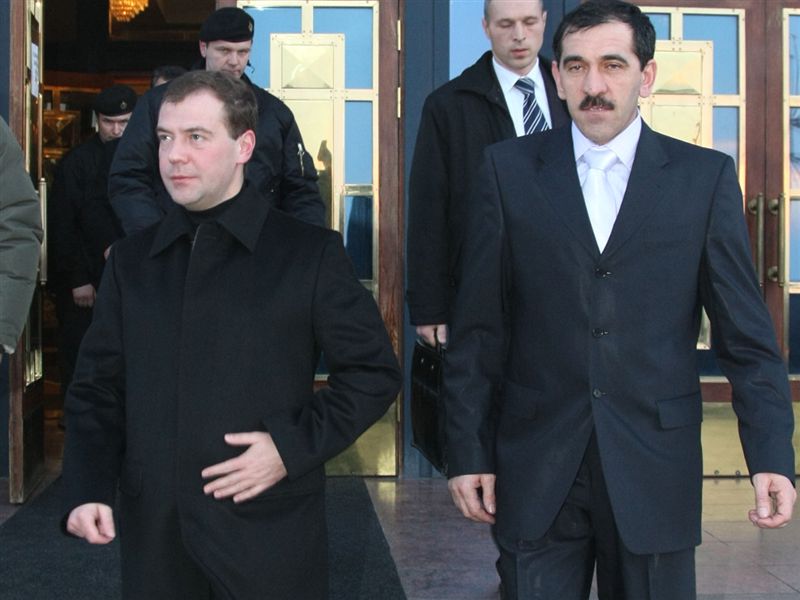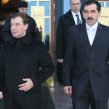
Moscow Struggles to Stabilize Ingushetia
Publication: Eurasia Daily Monitor Volume: 6 Issue: 196
By:

The Kremlin is maintaining its policy of trying to impose “external” rule on Ingushetia. The individual assigned to the post of prime minister of the republic is not only an outsider, but also an ethnic Russian. Such actions have aroused indignation within Ingushetia. For example, a leading Ingush human rights activist, Magomet Mutsulgov, publicly announced his disapproval of the federal center’s policies vis-à-vis Ingushetia, calling them an expression of mistrust of the local government on the part of the federal authorities. Mutsulgov expressed doubt that visiting officials could normalize the situation in the republic (www.gazeta.ru, October 16). Websites associated with the opposition in Ingushetia posted material portraying the republic’s new Prime Minister, Aleksei Vorobyov, as a corrupt official. According to these websites, Vorobyov was involved in the release of 15 armed members of the Sufi brotherhood of Batal-Haji Belharoev, who were earlier alleged to be insurgents (www.newsru.com, May 23). Despite Russian media reports that they were captured and detained, all of them were subsequently released without charge. The opposition websites suggest that they simply bought their way out. According to Ingushetia’s President Yunus-bek Yevkurov, he is being accused of precisely the problem that he intends to combat –corruption (www.ingushetia.org, October 17).
Not much is known about the new Prime Minister Aleksei Vorobyov. He was born in Ulyanovsk in 1964 and worked for 10 years for the federal tax service. Also, it is known that President Yevkurov and Vorobyov crossed paths during their military service, which is where their acquaintanceship took root. Vorobyov’s turbulent career in Ingushetia makes it possible that his appointment to the post of prime minister was neither an accidental nor a spontaneous decision. Until February 2009, he served in the capacity of a third-class state advisor to the Ingush president on issues involving the law enforcement agencies. On February 11, 2009, he was appointed as acting chief of the antiterrorist committee in Ingushetia. On March 24, he was appointed as the head of the republic’s Security Council (www.interfax.ru, October 16). According the newspaper Gazeta, no one was able to give any sort of description of Ingushetia’s new prime minister, since he was not known as an independent politician at either the federal or the regional level (www.gazeta.ru, October 16). RBK Daily suggested that the new premier comes from the Federal Security Service (FSB) circles (www.rbcdaily.ru, October 16), which follows the pattern of appointing FSB officers to various positions in the region. It should be remembered that Dagestan’s Interior Minister Ali Magomedov, like Vorobyov, previously held the post of Secretary of his republic’s Security Council. Ali Magomedov was an FSB general.
President Yevkurov also called for the creation of a teip council (a teip is a Chechen tribal organization or clan), which was merely an attempt to create the impression that authorities and society are closely collaborating (www.regnum.ru, October 10). In reality, for a long time the teips have not had the kind of importance in Russian politics that is ascribed to them.
Meanwhile, the Kremlin has tried to help President Yevkurov. A well-publicized statement claiming that the attempt on the Ingush president’s life has been solved turned out, unsurprisingly, to blame the attempted assassination of Yevkurov on the insurgents. That statement was made by the Director of the FSB Aleksandr Bortnikov. The attempted assassination was blamed on two slain rebels, Rustam Dzortov (“Abdul-Aziz”) and Abdul-Malika Aliev, who were identified as the heads of the Ingush jamaat (www.radiomayak.ru, October 13). It should be noted that the Ingush jamaat has always had just one unchallenged leader –emir Magas (Ahmed Yevloev). According to the FSB director, “during the last four months 19 terrorist attacks were prevented and almost 200 insurgents were killed in the North Caucasus.”
But it is nearly impossible to determine how many true guerillas and how many innocent victims there were among those killed in the special operations ubiquitously conducted by security forces in the region. Generally, the websites of the opposition present disclaimers regarding the alleged connection of one or another of the victims to the insurgents.
Bombings and armed attacks are everyday occurrences in Ingushetia, with several such incidents sometimes taking place during a single day. For instance, on the night of October 18, the city of Nazran was rocked by a powerful blast. It took place at the home of Adam Taziev, who is believed (by some Moscow analysts) to be a brother of emir Magas. A police officer was wounded in the Malgobek region on the same day. The morning of the October 18 started with an attack on law enforcement personnel: an explosive device went off on a road not far from a bridge across the Sunzha River as a police car was passing. At noon, another blast rang out in the outskirts of Magas. This time, it occurred just two yards away from a police post. There were no casualties among the police in either incident. On the evening of October 18, another explosion was heard in Nazran. All of this happened just 24 hours after a large-scale operation by the security forces against jamaat activities in the republic’s Sunzha district. Four alleged terrorists were killed in the operation: Nazir Gandarov, the brothers Aslan and Sulumbek Machukaev, and a woman, Roza Haiauri.
On October 19, a car rigged with explosives and parked next to government buildings in Nazran was defused. The power of the explosive device was estimated to equal 10 kilograms of TNT (www.rbc.ru, October 19).
It does not really matter where and when the explosions occur. What is more important is that Ingushetia remains the unquestionable de facto leader in numbers of attacks carried out by the armed opposition, despite the authorities’ claims regarding the number of eliminated insurgents. This can be explained by two factors. The first coincides with the opinion of human rights activists that innocent victims are among the people killed by the authorities. The second is that the more operations the security forces conduct in Ingushetia, the more people join the Ingush jamaat.
In any case, one can conclude that the large-scale counter-insurgency operations targeting Ingush rebels launched this past May, in which Chechen policemen have participated, have done nothing to fundamentally improve the situation in republic.




